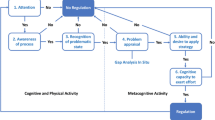Abstract
This article presents findings from a comparative case study of the learning experiences of two graduate students in an online action research course. The key roles played by reflection and co-reflection, an emerging concept, are identified through the use of narrative analysis. Co-reflection is a collaborative critical thinking process mediated by language, broadly construed to include all meaningful signs. Two types of co-reflection are proposed: tacit and active. Regardless of type, the evidence shows that co-reflection involves cognitive and affective interactions in synergy with relationship building. To the study of group cognition, this study contributes evidence of the potential of co-reflection as a core process. The simple, flexible software tools used in the course (wiki-style collaborative software and simple email and chat programs) effectively supported inquiry learning and co-reflection by allowing learners to freely and easily create their own web pages and to adapt the tools for their different communication and learning styles.
Similar content being viewed by others
References
Allen, C. (2004). Life with alacrity: Tracing the evolution of social software. Available at http://www.lifewithalacrity.com/2004/10/tracing_the_evo.html; Accessed December 1, 2005.
Bakhtin, M. M. (1986). Speech genres and other late essays. Austin, Texas: University of Texas.
Bandura, A. (1997). Self-efficacy: The exercise of control. New York: Freeman.
Barab, S. A., Schatz, S., & Scheckler, R. (2004). Using activity theory to conceptualize online community and using online community to conceptualize activity theory. Mind, Culture, & Activity, 11(1), 25–47.
Bereiter, C. (2002). Education and mind in the knowledge age. Hillsdale, New Jersey: Lawrence Erlbaum.
Boud, D., Keogh, R., & Walker, D. (1985). Promoting reflection in learning: A model. In D. Boud, R. Keogh, & D. Walker (Eds.), Reflection: Turning experience into learning (pp. 18–40). London: RoutledgeFalmer.
Bruner, J. (1996). The culture of education. Cambridge, Massachusetts: Harvard University Press.
Clark, H., & Brennan, S. E. (1991). Grounding in communication. In L. B. Resnick & J. M. Levine (Eds.), Perspectives on socially shared cognition (pp. 127–149). Washington, District of Columbia: American Psychological Association.
Dewey, J. (1910/1997). How we think. Mineola, New York: Dover.
Engestrom, Y. (2001) Expansive learning at work: Toward an activity theoretical reconceptualization. Journal of Education and Work, 14(1), 133–156.
Franzosi, R. (2004). From words to numbers. Cambridge: Cambridge University Press.
Habermas, J. (1984). The theory of communicative action: Volume one—Reason and the rationalization of society. Boston, Massachusetts: Beacon.
Habermas, J. (1987). The theory of communicative action: Volume two—Lifeworld and system: A critique of functionalist reason. Boston, Massachusetts: Beacon.
Heidegger, M. (1959/1971). On the way to language. New York, New York: Harper & Row.
Herman, D. (2003). Stories as a tool for thinking. In D. Herman (Ed), Narrative theory and the cognitive sciences (pp. 163–192). Stanford, California: Center for the Study of Language and Information.
Hutchins, E. (1995). Cognition in the wild. Boston, Massachusetts: Massachusetts Institute of Technology.
Issroff, K., & Scanlon, E. (2002). Using technology in higher education: An activity theory perspective. Journal of Computer Assisted Learning, 18, 77–83.
Kohler Riessman, C. (1993). Narrative analysis. Newbury Park, California: Sage.
Lave, J., & Wenger, E. (1991). Situated learning: Legitimate peripheral participation. Cambridge: Cambridge University Press.
Leont'ev, A. A. (1978). Activity, consciousness, and personality. Englewood Cliffs, New Jersey: Prentice-Hall.
McKernan, J. (1996). Curriculum action research. London: Kogan Page.
Mezirow, J. (2000). Learning to think like an adult: Core concepts of transformation theory. In J. Mezirow (Ed), Learning as transformation (pp. 3–33). San Francisco, California: Jossey-Bass.
Nardi, B. (Ed). (2001). Context and consciousness. Cambridge, Massachusetts: MIT.
Ricoeur, P. (1974). The conflict of interpretations: Essays in hermeneutics. Evanston, Illinois: Northwestern University Press.
Schon, D. (1983). The reflective practitioner. New York: Basic.
Schunk, D. H. (2000). Learning theories. Upper Saddle River, New Jersey: Merrill.
Stahl, G. (2006). Group cognition: Computer support for building collaborative knowledge. Cambridge, Massachusetts: MIT.
Suthers, D. (2005). Technology affordances for intersubjective learning: A thematic agenda for CSCL. In T. Koschmann, D. D. Suthers, & T. W. Chan (Eds.), Proceedings of Computer Supported Collaborative Learning 2005: The Next 10 Years! (pp. 662–671). Mahwah, New Jersey: Lawrence Erlbaum.
Toolan, M. J. (1988). Narrative: A critical linguistic introduction. London: Routledge.
Van Manen, M. (1977). Linking ways of knowing to ways of being practical. Curriculum Inquiry, 6(3), 205–228.
Vygotsky, L. S. (1978). Mind in society. Cambridge, Massachusetts: Harvard University Press.
Wells, G. (1999). Dialogic inquiry. Cambridge: Cambridge University Press.
Author information
Authors and Affiliations
Corresponding author
Rights and permissions
About this article
Cite this article
Yukawa, J. Co-reflection in online learning: Collaborative critical thinking as narrative. Computer Supported Learning 1, 203–228 (2006). https://doi.org/10.1007/s11412-006-8994-9
Received:
Revised:
Accepted:
Published:
Issue Date:
DOI: https://doi.org/10.1007/s11412-006-8994-9




